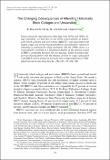The Changing Consequences of Attending Historically Black Colleges and Universities
Author(s)
Fryer, Roland G.; Greenstone, Michael
Downloadapp.2.1.pdf (273.1Kb)
PUBLISHER_POLICY
Publisher Policy
Article is made available in accordance with the publisher's policy and may be subject to US copyright law. Please refer to the publisher's site for terms of use.
Terms of use
Metadata
Show full item recordAbstract
Using nationally representative data files from 1970s and 1990s college attendees, we find that in the 1970s matriculation at historically black colleges and universities (HBCUs) was associated with higher wages and an increased probability of graduation, relative to attending a traditionally white institution. By the 1990s, there is a wage penalty resulting in a 20 percent decline in the relative wages of HBCU graduates between the two decades. There is modest support for the possibility that the relative decline in wages associated with HBCU matriculation is partially due to improvements in TWIs' effectiveness at educating blacks.
Date issued
2010-01Department
Massachusetts Institute of Technology. Department of EconomicsJournal
American Economic Journal: Applied Economics
Publisher
American Economic Association
Citation
Fryer, Roland G., and Michael Greenstone. 2010. "The Changing Consequences of Attending Historically Black Colleges and Universities." American Economic Journal: Applied Economics, 2(1): 116–48.© 2011 AEA.
Version: Final published version
ISSN
1945-7782